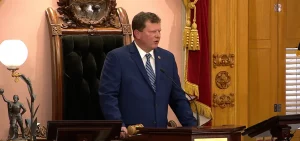News
Schools and local governments could lose over a billion dollars from tax changes backed by Ohio’s House Speaker
By: Karen Kasler | Statehouse News Bureau
Posted on:
COLUMBUS, Ohio (Statehouse News Bureau) — The bill that’s listed as the top priority of Ohio House Speaker Jason Stephens (R-Kitts Hill) and the Republican representatives who support him involves tax changes that would institute a flat tax and eliminate some property tax rollbacks.

In an interview for “The State of Ohio”, Stephens said he wants to separate the income tax and the property tax, noting that the 10% rollback was instituted in 1983 when the state income tax was created.
Stephens said, “Essentially in Ohio, we put we pay income taxes so that we can give ourselves a break on property taxes, which makes it hard to lower either one.”
As for House Bill 1, Stephens explained: “The way this will work hopefully is that if the property values go up, the inflation factor is in there, then the taxable rate will go down; therefore, keeping the dollar amount as an offset to inflation. Now the problem is, is for local governments, those automatic increases that have come over the years with inflating values are going to have to come from either votes of the voter or other ways of of dealing with that.”
Stephens said the explanation is complicated, but admits this could mean cities and counties, children’s services, libraries, parks and other entities could have to go to the ballot with levies.
“If a local area wants more fire department service, they vote for a levy. If they want more sidewalks – you know, it’s it’s again that self-determining factor,” Stephens said.
But Stephens said the state may replace the money that would have gone to local governments and schools to hold them harmless.
“Part of the bill also is talking about making those local entities whole this budget cycle the same way, similarly that the legislature did with the Medicaid sales tax a few years ago,” Stephens said. “So that’s the plan with that to keep local governments whole as far as not cutting but at least changing the system until we break the property tax away from the income tax.”
That has happened with tax changes in other budgets, as Stephens noted. In 2017, state lawmakers distributed $50 million in one-time money to patch holes in local budgets from the federal government’s elimination of the ability to tax Medicaid managed care providers. Local transit was primarily affected by that.
But the idea of the state holding local entities harmless often isn’t sustained over time. For instance, that same year lawmakers also requested in the budget that the state ask the federal government to allow a higher tax or a “franchise fee” for five years to replace that lost revenue. Republican former Gov. John Kasich vetoed that provision.
And in 2015, state lawmakers included in the budget $78 million to school districts to make up for the phase out of the tangible personal property tax (TPP) that started in 2005, under Republican former Gov. Bob Taft. Kasich vetoed that too.

